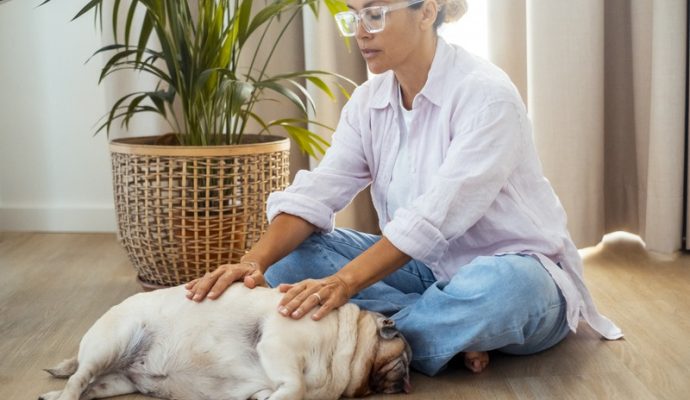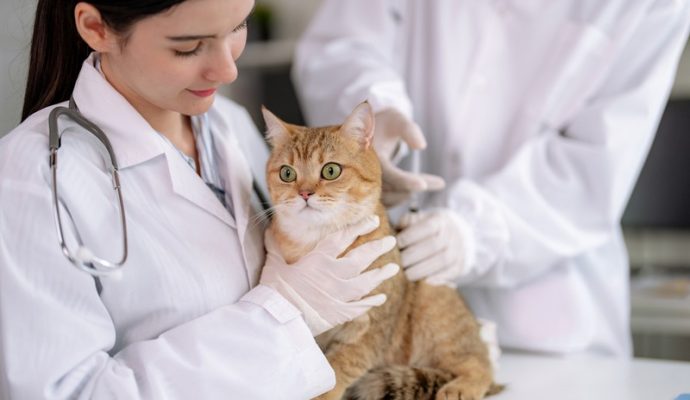Are you taking your furry buddy to a vet for the first time? That’s a big step in being a responsible pet owner! A veterinarian is like a doctor for animals, and they help keep your pet happy and healthy. To get the most out of this visit, it’s smart to come up with a bunch of questions. Don’t worry; no question is too simple or silly when it comes to your pet’s health.
Understanding Your Pet’s Health
When you first walk through the doors of the vet’s office with your pet, it’s helpful to know what you should be asking. Your vet is a great source of information, and their answers can help your pet live a long and healthy life.
Initial Health Assessment
-
Medical History: Tell your vet about any past sicknesses, odd behaviors, or anything else that seems important about your pet.
-
Vaccination: You’ll want to find out which shots your pet needs to stay safe from diseases. Always ask when these shots need to be updated—just like how kids need shots, pets do, too.
-
Dietary Needs: Chat about what your pet should eat. It’s important because, just like us, pets need good food to stay healthy.
Routine Care
-
Regular Check-Ups: Ask the vet how often you should bring your pet back for health checks. These visits help catch any problems early.
-
Neutering/Spaying: These are operations that can help your pet live a healthier life. Ask the vet about the benefits and when is the best time for your pet to have this done.
-
Pet Insurance: Vet bills can get expensive, just like human doctor bills. Find out if there’s insurance you can get to help with costs.
Caring for Young and Aging Pets
Pets, whether they’re just starting their journey or are in their golden years, have unique needs. Knowing which questions to ask for each age group is important.
Puppy’s First Visit
-
Vaccination Schedule: Learn about when your new puppy needs their shots. It helps them not to get sick from some pretty nasty bugs.
-
Pet Dietary Advice: Puppies grow fast, so you should ask what food is best and how much they should have each day.
-
Behavioral Tips: If you have a bouncy puppy that turns into a little troublemaker sometimes, ask the vet for tricks to help them behave better.
Older Pets Care
-
Senior Health Checks: Find out how often your older buddy should see the vet. Just like older people, older pets need a bit more care.
-
Mobility: Many older pets have a harder time moving around. Ask how you can help keep them comfortable as they age.
-
Mental Health: Yes, pets can get sad or stressed, too. Learn how to keep them feeling happy and sharp in their older years.
Wellness and Preventative Medicine
Vets don’t just fix problems; they help prevent them, too! Going to the vet isn’t just about getting help when your pet is sick—it’s also about keeping them from getting sick in the first place.
-
Disease Prevention: Different animals can get different kinds of illnesses. Ask what common diseases might affect your pet and what you can do to keep them safe.
-
Pet Wellness Exams: This is like a regular check-up where the vet looks over your pet to make sure everything’s okay. It’s super helpful in keeping them in tip-top shape.
-
Early Detection: Catching a sickness early can make a huge difference. Ask how you can tell if something might be wrong with your pet before it gets serious.
Part of your pet’s regular check-ups might involve dog wellness exams. These special checks are all about spotting trouble before it starts, keeping your buddy bouncing happily for years to come.
Pet Behavioral Concerns
The way our pets act can say a lot about how they’re feeling. If your pet is acting in a way that seems off, or if you’re struggling with training, your vet can give you some advice.
-
Normal vs. Abnormal: Ask what behaviors are typical for your kind of pet and what signs might show a problem.
-
Training Tips: If your pet’s behavior is making you pull your hair out, ask for some tips on helping them learn better habits.
-
Pet Anxiety: It’s not unusual for pets to feel nervous, especially about visiting the vet. Please find out how you can make things less scary for them.
Advanced Veterinary Care
Modern vet clinics can do a lot for pets, way more than just giving shots or fixing a broken leg. If your pet ever needs extra help, it’s good to know what’s available.
-
Emergency Services: It’s always helpful to know if your vet can help in a real emergency. Ask what you should do if something unexpected happens.
-
Diagnostics: If your pet is feeling under the weather, your vet might need to do some tests to figure out what’s wrong. Ask about what kinds of tests they can do.
-
Surgery: No one likes the idea of their pet needing surgery, but if it comes to that, it’s good to know what your vet can do.
Addressing Special Needs
Some pets have unique challenges, and knowing what support your vet can offer can make all the difference.
-
Chronic Conditions: If you have a pet with a long-term illness, your vet can help manage it. Ask about different treatments and support.
-
Physical Therapy: Like humans, some pets might need physical therapy. You can ask about services that help pets with injuries get better, including things like laser therapy for dogs.
-
Special Diets: Some health problems in pets can be helped a lot with the right food. Find out if there are diets that could help your pet feel better.
Dental and Daily Health
Just like us, pets need to have their teeth taken care of, too. A healthy mouth can help keep the rest of the body healthy, too. Could you be sure to ask about how to keep your pet’s pearly whites clean and shiny?
-
Dental Check-Ups: Teeth problems can be painful and cause other health issues. Ask how often your pet should have their teeth checked and cleaned.
-
Dental Hygiene Practices: Your vet can show you how to brush your pet’s teeth or give you other options to keep their mouth clean.
-
Common Dental Problems: Teeth issues are pretty common in pets. Find out what to watch for and how to stop problems before they start.
Navigating Veterinary Services
Choosing the Right Clinic
-
Reputation: Ask around or look online to see what other people say about the vet clinics you’re considering.
-
24-Hour Service: It’s super important to know if you can see a vet even in the middle of the night. Some vets stay open all night long for emergencies.
-
Staff Qualifications: Feel free to ask about how much experience the vet and their team have. You want the best care possible for your pet buddy!
Visiting the Vet
Sometimes, you visit the vet to stay one step ahead of any health problems. For example, getting your dog their shots, like dog vaccinations in Enterprise, is one of the simplest ways to protect them from some pretty bad illnesses.
To End
Remember, when you take your furry or feathered friend to the vet for the first time, write down all the questions that pop into your head before you go. Talking openly with your vet will help you be the best pet owner you can be. Together, you’ll be making sure your pet gets all the care they need to have a happy and spunky life. After all, they’re not just pets—they’re family!




